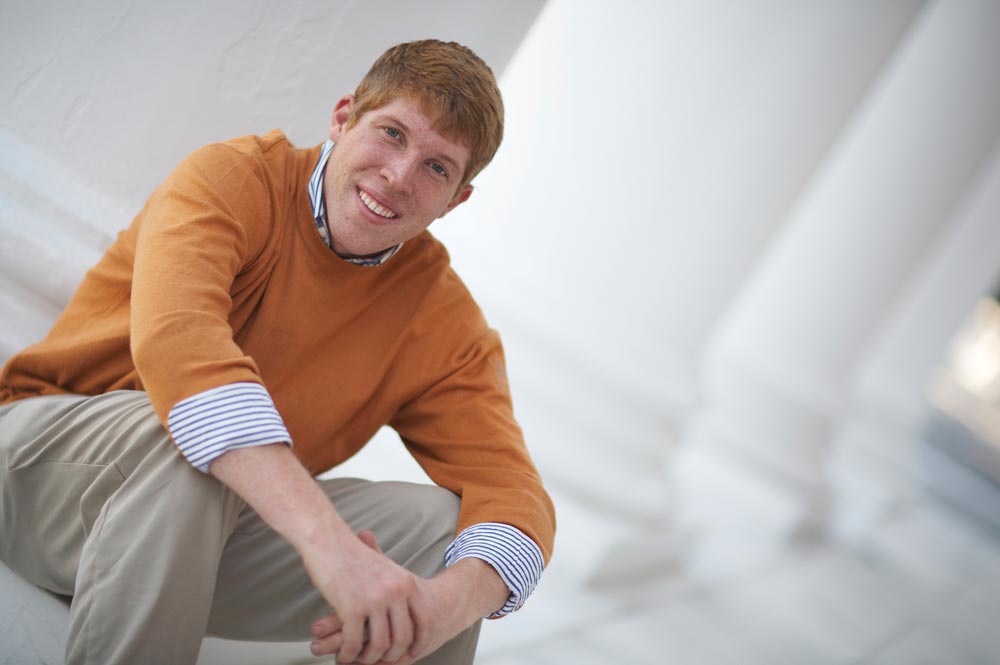Taking it to the Streets
Ross Baird asks what makes people vote

One muggy night this past summer, undergraduates Ross Baird (Col ’07) and Davis Zaunbrecher (Col ’09) sat in the dark in a rusted-out warehouse in Fort Valley, Ga., watching as 18-year-old high school graduates and 45-year-old overweight men smashed each over the head with chairs during a pro-wrestling match. “The crowd was going nuts,” Baird recalls. For Baird, it was just another opportunity for research, as he chatted with local spectators about their political views amid all the hooting and hollering. Baird’s trip to Georgia was the latest in a succession of scholarly projects he’s undertaken with the help and mentorship of politics professor Larry Sabato, aimed at answering a question that sounds deceptively simple: What makes people vote? In the past 30 years, voter turnout in the U.S. has dropped precipitously; participation in political groups also has declined. By investigating what motivates people to become civically engaged, Baird hopes to better understand how to make our democracy work more effectively.
With Sabato’s help, during his second year Baird obtained a fellowship at Washington, D.C.’s Center for the Study of the Presidency, where he looked into whether participating in presidential service programs led people to become more politically active. He concluded that only “inspirational” programs, such as the Peace Corps, resulted in greater civic involvement—which only whetted his curiosity to find out what exactly spurs civic participation.
Baird pursued a Harrison Undergraduate Research Award to examine firsthand why certain European countries consistently have higher voter turnouts than the U.S. The summer after his second year he traveled through Austria, Croatia, England and Italy, talking to ordinary citizens about their reasons for going to the polls. In Italy, he discovered most people think the government is corrupt. Nevertheless, voter turnout remains extremely high. When asked for an explanation, one man replied in Italian, “Hope is the last thing to die.”
Baird also found more practical reasons for Europeans’ civic involvement. “The more political parties there were, the more people thought there was someone for them,” he explains, pointing out that Austria has six parties, and Italy a whopping 174.
“Another thing is elections are very easy there,” he says. “People voted on Saturdays.” According to the politics honors major, other factors include history, local pride and civic education. In Italy, for example, elections benefit from centuries of voting tradition, whereas in Croatia, democracy is so new that no one takes citizen participation for granted.
Although his European research offered ideas about what might increase civic involvement in the U.S., Baird still wondered why some Americans decide to vote while others stay home. This past summer, he undertook a second Harrison grant to conduct his study again, this time in Georgia. He teamed up with fellow student Davis Zaunbrecher, and the pair crisscrossed the state, interviewing crowds at baseball games, gas stations and church services.
“Ross loves people. There’s no other way for me to put it,” says Zaunbrecher. “I can’t tell you how many times we’d be in separate parts of a city during the day, and he’d call me to excitedly report how—insert adjective here—the person he just talked to was. He also lives by the principle that the easiest thing to do in the world is to be nice to everyone you cross paths with.”
One of Baird’s most memorable experiences was attending the Zion Missionary Baptist Church conference. A preacher he had interviewed earlier at a gas station invited him to the meeting. “This was hundreds of black ministers and church leaders from all over Georgia for the day—and me,” says Baird, who is white with red hair and freckles. Baird discovered that black churches serve as centers for civic engagement and learned African Americans over age 50—i.e., those who lived through the 1965 Voting Rights Act—are Georgia’s most consistent voting bloc.
One of Baird’s most compelling conclusions from his Georgia odyssey is that candidates often matter more than issues. He points to the case of Sheriff Buddy Glass in Miller County, Ga. “‘Mr. Buddy,’ as he is affectionately known in the county, single-handedly drives turnout,” Baird says. “It’s up 20 percent when he runs because people love him so much and turn out to vote for him.”
“I would advise political strategists,” he continues, “to, instead of trying to find wedge issues to divide the public and win over swing voters, find the best possible candidates.”
Having returned to Charlottesville and a room on the Lawn for his fourth year, Baird, a Jefferson Scholar and president of the Class of 2007, intends to teach public school for a year or two after graduation. This past year, he won a prestigious Harry S. Truman Scholarship, which recognizes students who are committed to working in the public sector. Baird plans to use the scholarship money to study educational policy.
“I have a lot of ideas,” he says. “I think I need to learn more.”